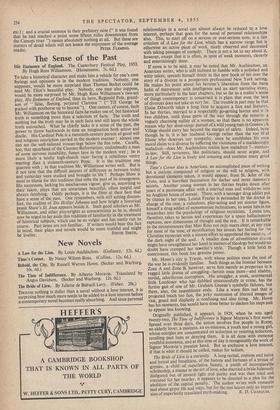The Sense of the Past
His Eminence of England. The Canterbury Festival Play, 1953. By Hugh Ross Williamson. (Heinemann. 7s. 6d.) To take a historical character and make him a vehicle for one's own feelings and opinions is in the modern tradition. Nobody, one supposes, would be more surprised than Thomas Becket could he read Mr. Eliot's beautiful play. Nobody, one may also suppose, would be more surprised by Mr. Hugh Ross Williamson's two-act play, His Eminence of England, than its hero, Reginald Pole, grand- son of " false, fleeting, perjured Clarence " (" Till George be packed with posthorse up to heaven"). One cannot, of course, fault Mr. Williamson on the historical facts he makes use of, but historical truth is something more than a selection of facts. The truth and nothing but the truth may lie in such facts and still leave the whole truth untouched. What he chiefly lacks is a sense of the past, the power to throw backwards in time an imagination both active and docile. His Cardinal Pole is a twentieth-century person of good will and religious conviction carried in the modern manner ; almost one can see the well-tailored trouser-legs below the fine robe. Caraffa, too, that spearhead of the Counter-Reformation, undoubtedly a man of some nervous instability, fumes here in the modern way ; he is more likely a tetchy high-church vicar facing a rebellious vestry -meeting than a sixteenth-century Pope. It is the tradition one quarrels with ; in that tradition Mr. Williamson writes well. But is it not time that the difficult accents of diffeyence as between today and yesterday were studied and brought to life ? Perhaps Shaw is most to blame for this tradition that robs the past of its strangeness. His successors, lacking his mischievous vigour, give us, according to their talent, plays that are sometimes beautiful, often insipid and always falsifying. Oddly perhaps, it is the films at their best that have a sense of the past. One remembers, with still aching discom- , fort, the realism of Die Heilige Johanna and how bright a historical prank Shaw's St. Joan appears beside it. Such good scholars as Mr. Williamson, and other playwrights as conscientious as he is, should now be urged to lay aside this tradition of familiarity in the treatment of historical subjects, which can be so vulgar and has surely run its course. Past times are not familiar. If writers would bear this fact in mind, their plays and novels would be more truthful and might


































 Previous page
Previous page